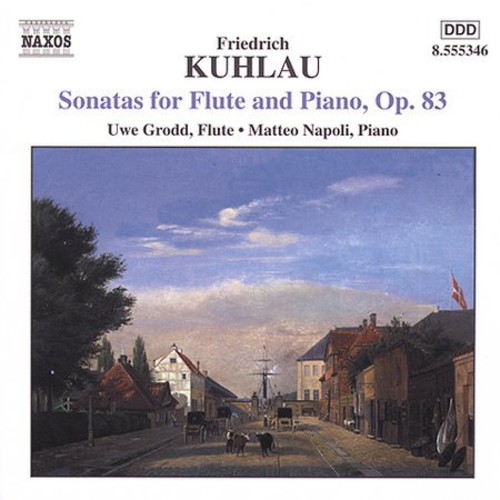Show results for
Deals
- 4K Ultra HD Sale
- Action Sale
- Alternative Rock Sale
- Anime sale
- Award Winners Sale
- Bear Family Sale
- Blu ray Sale
- Blues on Sale
- British Sale
- Classical Music Sale
- Comedy Music Sale
- Comedy Sale
- Country Sale
- Criterion Sale
- Electronic Music sale
- Fantasy Film and TV
- Folk Music Sale
- Hard Rock and Metal Sale
- Horror Sci fi Sale
- Jazz Sale
- Kids and Family Music sale
- Kids and Family Sale
- Metal Sale
- Music Video Sale
- Musicals on Sale
- Mystery Sale
- Naxos Label Sale
- Olive Films on Sale
- Page to Screen Sale
- Paramount Sale
- Pop and Power Pop
- Rap and Hip Hop Sale
- Reggae Sale
- Rock and Pop Sale
- Rock Legends
- Soul Music Sale
- TV Sale
- TV Sale
- Vinyl on Sale
- War Films and Westerns on Sale

Sonatas for Flute & Piano Op 83
- Format: CD
- Release Date: 2/19/2002

Sonatas for Flute & Piano Op 83
- Format: CD
- Release Date: 2/19/2002
- Composers: Friedrich Kuhlau
- Performers: Uwe Grodd
- Label: Naxos
- UPC: 747313534623
- Item #: NAX353462
- Genre: Classical
- Release Date: 2/19/2002
- This product is a special order
Product Notes
Kuhlau, as a successful pianist and teacher, wrote a quantity of music for the piano, although his second piano concerto was destroyed in the fire of 1831. These compositions included salon music and pieces of varied technical difficulty that were of practical use in teaching. In addition to his stage works, which enjoyed variable success, he left songs and chamber music, with a particular emphasis on compositions for the flute, an instrument that it seems that he did not play himself, profiting, however, from the technical advice of a flautist in the theatre orchestra. His first attempts at writing for the flute had been in Hamburg, but it was in the 1820s that he embarked on a series of works, including the three Sonatas for flute and piano, Opus 83, published in Bonn in 1827, that earned for him the title of 'the Beethoven of the flute'. The Sonata in G major, Opus 83, No.1, touches on G minor almost at once and continues in a form that suggests the classical inheritance that he enjoyed, as a near contemporary of Weber, from the world of Mozart and of Beethoven. The minor-key slow movement brings variations on a Swedish song, Sorgens magt (Sorrow's Might), although melancholy is dissipated in passing, before the final return of the theme. The sonata ends with a movement in which flute and piano set out to match each other in brilliance, their course interrupted by a passage marked Andante sostenuto, brought to an end by a piano cadenza. The second of the set, the Sonata in C major, Opus 83, No.2, has further suggestions of Beethoven. The first movement has a dramatic slow introduction in C minor, before the piano launches into a C major Allegro, soon to be joined by the flute, in thematic material foreshadowed in the introduction. The E major Larghetto starts with the singing tone of the piano, soon joined by the flute. The last movement opens with a principal theme that, as so often, touches briefly on the minor, a rondo that offers both instruments a chance of display in a movement that brings episodes of distinct contrast. The set ends with the Sonata in G minor, Opus 83, No.3. It is introduced by the piano, soon joined by the flute, in a movement that has the element of drama suggested by the choice of key. The hymn-like lyricism of the slow movement is varied as the movement proceeds, before the initial serenity is restored. The sonata ends with a Rondo alla polacca, in which an opportunity is again offered for concluding brilliance in the writing for both instruments.


